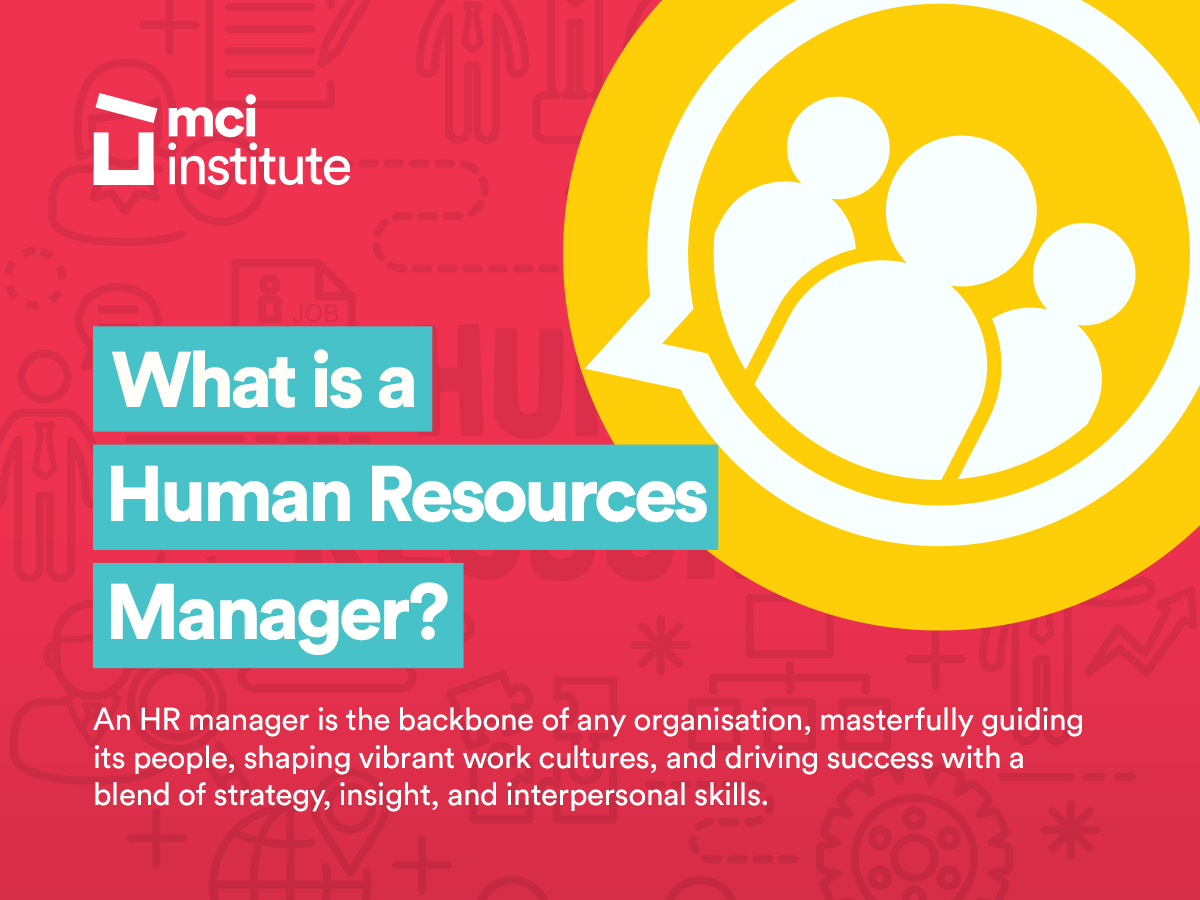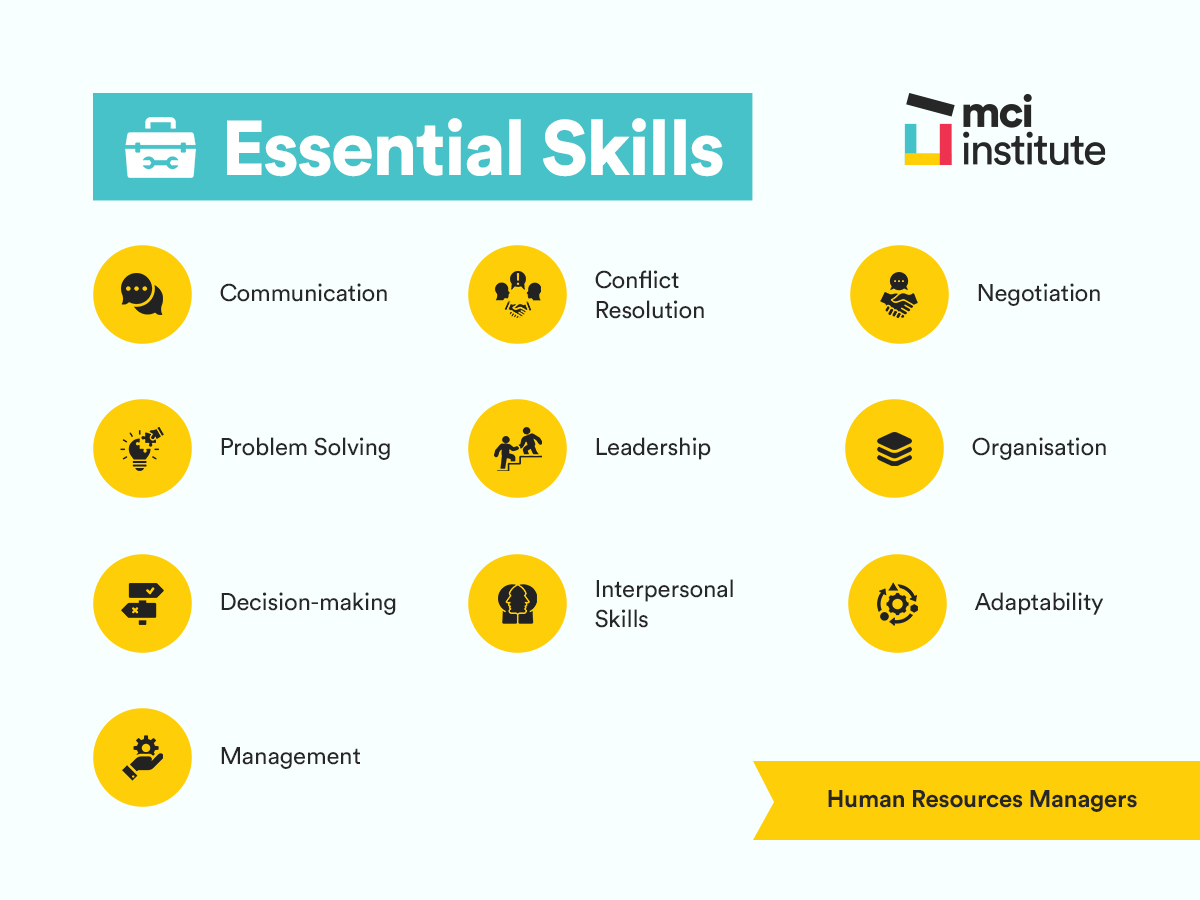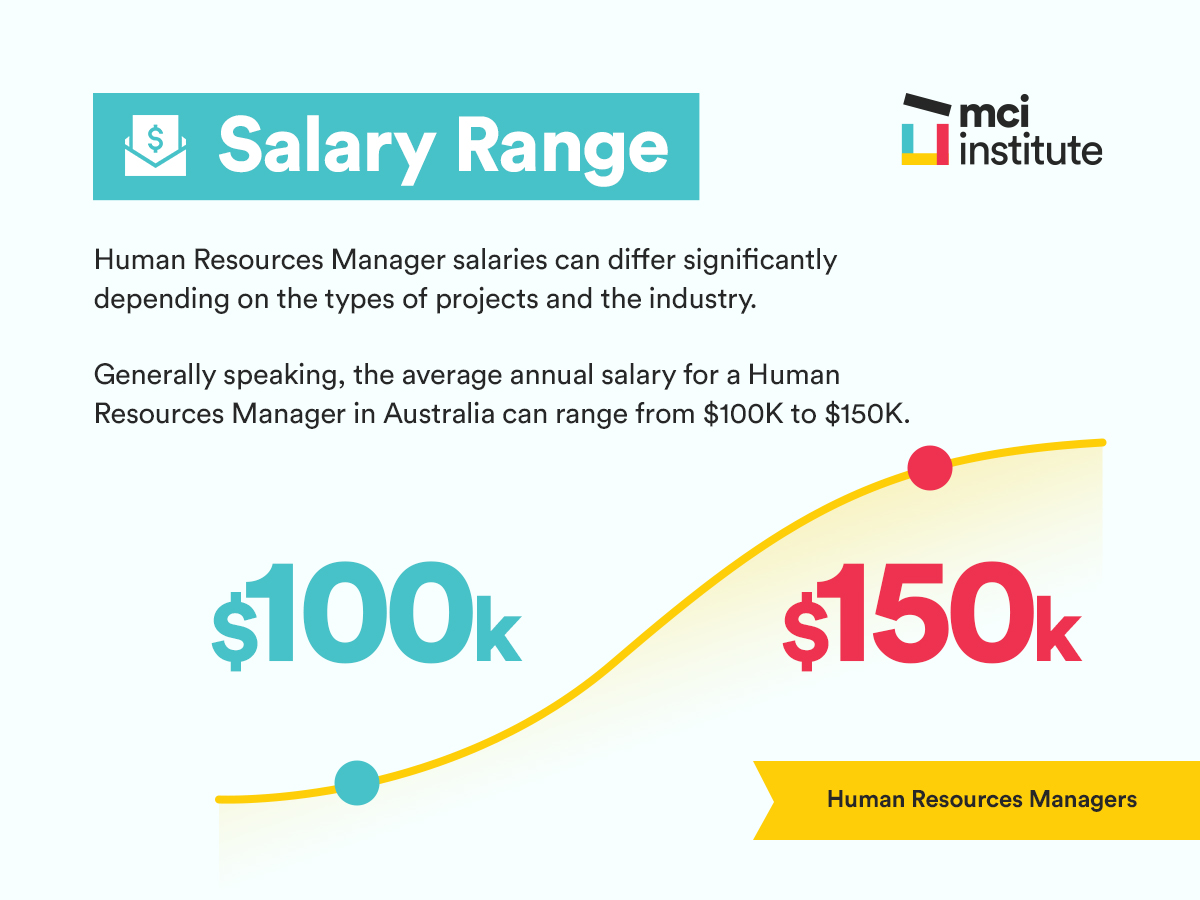In the bustling organisations of today, the role of a human resources manager is pivotal.
Whether it's recruiting the right talent, nurturing a positive work culture, or ensuring compliance with labour laws, a proficient human resources manager is instrumental in steering your organisational ship smoothly.
So what exactly does a human resources manager do, and what skills do you need to succeed in the role?
What is a human resources manager?

A human resources manager is entrusted with the responsibility of managing its most valuable assets -- its people.
Their multifaceted role encompasses recruiting and onboarding new employees, fostering a conducive work environment, managing employee relations, and overseeing training and development initiatives.
By aligning the human capital with the strategic goals of the organisation, a human resources manager not only contributes to a harmonious workplace culture, but significantly impacts the overall productivity and success of the organisation.
This is done through adept interpersonal skills, knowledge of legal frameworks, and a keen understanding of organisational behaviour and development. HR managers navigate the complex dynamics of the workplace, ensuring a balanced and progressive work ecosystem.
Key responsibilities of a human resources manager
An HR manager is the linchpin that holds together the diverse threads of an organisation. Their core responsibilities include but are not limited to:
Recruitment & selection
Identifying and onboarding the right talent is fundamental. A wrong hire can cost the organisation dearly, not just in monetary terms but also in team morale and productivity.
Responsibilities include:
- Job analysis and description
- Sourcing candidates
- Screening and interviewing
- Background checks and reference checks
Employee relations
Fostering a positive, inclusive, and engaging work environment is crucial for employee retention and overall organisational success.
Responsibilities include:
- Creating and enforcing policies and procedures
- Handling employee grievances and complaints
- Promoting employee engagement and satisfaction
- Ensuring a safe and healthy work environment
Training and development
Continuous learning is the bedrock of personal and professional growth. Ensuring employees have access to necessary training and development resources is vital.
Responsibilities include:
- Identifying training needs
- Developing training programs
- Implementing training programs
- Evaluation training effectiveness
Performance management
Setting clear performance standards and expectations, and conducting performance evaluations with constructive feedback, is imperative in ensuring everyone is performing and moving the business forward.
Responsibilities include:
- Setting performance standards
- Conducting performance appraisals
- Providing feedback and coaching
- Addressing performance issues
Legal compliance
Adhering to legal compliances and evaluating employee performance transparently and fairly underlines the ethical fabric of the organisation.
Responsibilities include:
- Understanding employment laws and regulations
- Ensuring compliance with labour laws
- Managing employee records and documentaion
- Handling legal disputes and investigations
Workforce planning
Anticipating workforce needs based on business goals is a key responsibility of an HR manager. You'll need to develop strategies for talent acquisition and retention, and also manage succession planning and career development paths for employees.
Responsibilities include:
- Forecasting workforce needs
- Developing recruitment and retention strategies
- Succession planning
- Career development planning
Organisational development
As an HR manager, you may find yourself assisting in the development and implementation of organisational policies and procedures. This involves advising management on human capital issues and proposing solutions, and also monitoring and enhancing organisational culture.
Responsibilities include:
- Advising on human capital issues
- Developing organisational policies
- Monitoring organisational culture
- Proposing solutions to organisational challenges
Compensation and benefits
Ensuring fair and competitive compensation and benefits is essential for attracting and retaining talent.
Responsibilities include:
- Developing and administering compensation plans
- Managing employee benefits programs
- Ensuring compliance with legal requirements
- Conducting salary surveys and market analysis
Why become a human resources manager?
Becoming a human resources manager comes with a host of benefits that are rewarding, both in a person and professional capacity.
- Career growth: the HR field offers a robust career ladder. As you gain experience and expertise, you can ascend to higher positions like Senior HR Manager, Director of Human Resources, or even Chief Human Resources Officer (CHRO).
- Job stability: HR is a crucial function in every organisation, making HR roles relatively stable and in-demand across various industries.
- Competitive salaries: human resource management often comes with competitive salaries, which increase with experience and additional qualifications.
- Skill development: you'll nurture a range of valuable skills, including communication, problem-solving, negotiation, and leadership -- which are easily transferrable to other roles and industries.
- Network opportunities: HR managers interact with a range of professionals, both within and outside their organisations. You'll create a vast network of connections that can be beneficial in your existing role, and also in the future.
- Impactful work: HR managers are for the people. You have the ability to create a positive work environment, influence organisational culture, and contribute to overall success, which can be very fulfilling.
- Continuous learning: the dynamic nature of labour laws, technology, and workforce management trends offer continuous learning opportunities for HR managers.
- Diverse work environments: as an HR manager, you'll have the opportunity to work across a variety of sectors and industries, giving you diverse work experience.
- Global mobility: with a background in human resources management, you can work in international settings. HR principles are globally applicable, though they may require adaptation to local laws and customs. But it means you can pretty much go anywhere and find a role where you can apply your skills.
- Enhanced employability: the skills and knowledge acquired as an HR manager are valuable and can enhance your employability, even if one chooses to transition into a different career path later on.
Essential human resources manager skills

There are a range of skills you'll need to have or develop to be a good HR manager. The good news is, if you need to brush up on some things, we've got a range of online courses to get you headed in the right direction.
Some essential skills for the role include:
- Communication skills: the ability to convey information clearly and effectively through both verbal and written communication.
- Conflict resolution: conflict can be tricky. You'll need to be skilled at mediating disputes and resolving conflicts in a fair, unbiased manner.
- Negotiation skills: you'll be effective in negotiating terms, conditions, and agreements to ensure the best interests of your organisation and employees.
- Problem-solving: you're capable of identifying issues and developing solutions to ensure smooth operations, both in the HR department and your organisation.
- Leadership and management: you have the ability to lead, manage, and motivate your team to achieve department and organisational goals.
- Organisational skills: you need to be proficient in planning, organising, and prioritising tasks to manage time and meet deadlines. You may often find yourself juggling several things at once, so this one is imperative.
- Decision-making: as an HR manager, you may find yourself in a position where you need to make some challenging decisions. You need to be capable of making informed and effective decisions, even when under pressure.
- Knowledge of employment laws and regulations: everything needs to be by the book -- always. Understanding and staying updated on employment laws, regulations, and best practices to ensure organisational compliance is crucial.
- Ethical judgment: as an HR manager, it's your responsibility to uphold a strong ethical stance and ensure integrity in all HR practices and interactions.
- Interpersonal skills: building and maintaining positive relationships with employees, management, and external stakeholders alike is important.
- Adaptability: today's modern workplace is dynamic and fast-moving. You need to be able to adapt to changes and stay flexible in this work environment.
- Performance management: you'll need to design, implement, and oversee performance management programs that drive productivity and employee growth.
Pathways to becoming a human resources manager
To become an HR manager, you'll generally need a tertiary qualification and relevant industry experience.
- Gain a formal qualification. Common degrees include a Bachelor of Business majoring in Human Resource Management, or a degree in a related field like Business Management or Occupational Health and Safety. While a Bachelor's degree is the common pathway, a Diploma in Human Resources Management can also be beneficial.
- Get industry experience. Working in the HR field or in positions that involve people management is a great start. Some HR professionals are promoted internally within their organisations, even though they may not have formal HR qualifications. Completing internships while you're studying will also make you stand our from the pack. You might also consider starting out as a Human Resources Coordinator to build up experience, and advance from there.
- Further education. If you're looking to switch careers into HR from something else, pursuing a Graduate Certificate in Human Resource Management or a Master of Human Resource Management can be a beneficial step. The Master of Human Resource Management is accredited by the Australian Human Resources Institute (AHRI).
Human resource manager salary

Human resource manager salaries can range depending on your industry and the type of company you work for.
As a human resource manager in Australia, you can generally expect to earn between $100K-$150K annually.
Human resources manager resume tips
When you're applying for a job, all of the usual resume rules apply: use a professional format, include relevant job description keywords, and tailor it to the job you're applying for.
You'll also want to:
- Highlight your HR certifications. Mention anything HR-specific, like SHRM-CP or PHR.
- Showcase your HR achievements. Make sure you quantify your impact e.g. 'Reduced employee turnover by 15%'
- Detail your HR software proficiency. List what you know, like Workday or ADP.
- Highlight your understanding of HR e.g. talent acquisition, employee management, conflict resolution.
- Mention legal compliance. Highlight your experience in ensuring organisational compliance with labour laws.
Don't forget your soft skills! Soft skills like communication, emotional intelligence, and organisation may seem like a given, but are still worth mentioning -- even better if you can relate them back to why they're essential skills of an HR manager!
Human resources manager interview questions
If you're interviewing for a human resources manager position, it's an exciting time! Along with the usual types of questions you'd expect from an interview, there are also some HR-specific questions you should prep for to make sure you can showcase the full breadth of your skills. Use the below as a guide!
- Can you describe your experience with handling conflict resolution?
- What methods do you use to measure employee engagement?
- How do you stay updated on labour laws and industry regulations?
- Describe a time when you had to handle a particularly delicate employee situation.
- How do you handle employee training and development?
- Describe your experience with HR software and analytics.
- How do you ensure the accuracy and privacy of employee records?
- What strategies would you use for talent acquisition and retention?
Questions will differ depending on the job you're applying for. One of the most effective ways to prep is to write down a list of all of the KPIs mentioned in the role description and think of examples of the ways you've achieved these KPIs in past roles (or how you would achieve them if this is your first role).
Take the next step in your HR career
Whether you're looking to hone your existing HR skills or considering a transition into the field, MCI Institute's range of HR courses online can set your career in motion and equip you with the skills to succeed. Explore our nationally recognised online courses today!
Excited to showcase the role of a human resources manager on your website? Go ahead and embed this infographic with ease! Just copy and paste the HTML code provided below into your site's code, and you're all set to share this insightful visual with your audience.

.png?width=113&name=MCIinstitute_RGB_Color_Black-01%20(2).png)


